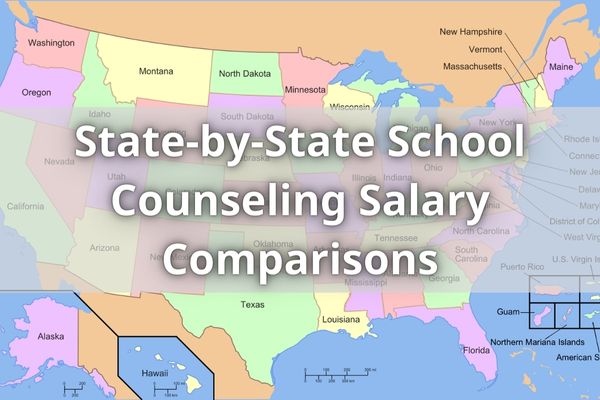School Counselor Salary And Job Outlook In 2023
We are all aware of the crucial role school counselors play in assisting children in realizing their full potential. But what compensation do they receive for their labor?
In this post, we’ll look at the wages of school counselors nationwide and identify the variables that affect them. We’ll look at state-by-state comparisons and benefits packages, as well as provide tips on negotiating salary with employers. Additionally, we’ll explore professional development opportunities and what the job outlook looks like for future school counselors.
So join us as we take an in-depth look into the world of school counselor salary!
Average Salary For School Counselors

The average remuneration for those in the profession of school counseling is quite substantial. According to data from the U.S. Bureau of Labor Statistics, the median salary for a school counselor was $56,310 annually as of May 2019. This amount demonstrates how far one can take their career and demonstrates how satisfying and successful it is.
When comparing typical earnings across sectors, school counselors earn significantly more than the national average, which is close to $30,000. The job outlook for counselors is expected to grow by 8 percent through 2026. They are projected to have a higher median pay than most other occupations in the same field, such as social workers or psychologists.
The annual salary range for school counselors varies depending on several factors such as location, experience level, and type of institution where they work – private or public schools; research universities or community colleges; elementary or secondary schools, etc. Additionally, due to their experience in certain subjects like substance misuse or mental health difficulties, counselors who specialize may be able to earn better wages than general counselors.
It is obvious that school counseling offers a fantastic chance for individuals who want to positively influence young people’s lives while earning a good living salary. With continual growth in demand and potential opportunities for increased specialization within the field, there’s no doubt that this profession will continue to provide financial stability and professional satisfaction long into the future.
Moving forward, we’ll look at some of the factors that influence how much money you can expect to earn if you choose this career path.
Factors That Influence School Counselor Salaries
You may be wondering what factors can affect your earnings as a guidance professional. The school district a counselor works for, the location of the school, and the counselor’s degree of education and experience all play a role in determining their salary.
According to the Bureau of Labor Statistics (BLS), school counselors earned a median annual salary of $57,040 in 2019. Though earnings differ greatly from state to state, some states pay much more than others.
In addition to geographical location, counselors’ pay also depends on their educational background and years of experience. Those who have more advanced degrees or specialized training may earn higher salaries than those with less formal education. Also, counselors who have had more years of experience typically earn higher salaries than those just beginning a career in this field.
Another factor that can influence a school counselor’s salary is their place of employment. Counselors working in private schools often receive better pay and benefits packages than those employed by public schools due to limited resources available from state governments. Similarly, counselors working at universities or colleges tend to receive higher compensation because they often specialize in different areas such as college counseling or advising students on academic pathways or post-secondary opportunities.
Finally, counselors employed by government agencies such as child protective services typically make more money than those working in public schools since these organizations have larger budgets allocated for employee wages and benefits packages.
Schools also determine how much they will pay their guidance professionals based on various criteria such as student enrollment numbers, overall budget sizes, and staffing needs at each individual site. For example, counselors at larger schools with greater student populations are usually paid more than those at smaller sites with fewer students enrolled because it requires more time and effort to support a larger number of children and families each day. On the other hand, if a district has limited funding resources but still needs additional guidance staff members then they might offer lower wage options due to financial constraints placed upon them by local governments or community stakeholders.
In addition to geographical location and place of employment, there are many other factors that help determine school counselor salaries including:
- job responsibilities assigned within an organization
- availability of continuing education opportunities
- certification status achieved through professional development activities
- any additional bonuses offered through employer contracts
- availability of flexible work arrangements; access to healthcare plans
- retirement incentives provided by employers
- workload expectations established by supervisors or administrators overseeing each individual position within their given organization
As you can see, there are numerous elements that go into determining compensation levels for guidance professionals. It’s important for prospective applicants to research all aspects related to earning potential before deciding what path is best suited for them when pursuing a career in this field moving forward.
Education Requirements For School Counselors
You must fulfill specific educational criteria in order to work as a counseling professional. Students’ lives are significantly impacted by school counselors, who support them as they deal with their social and academic difficulties.
Before being certified and engaging in professional practice, school counselors are often required to hold a master’s degree in school counseling or a closely related subject. Despite the fact that certain colleges and institutions provide school counseling programs for undergraduates, most employers prefer candidates who have at least a master’s degree.
In addition to possessing a graduate-level education, aspiring school counselors must also obtain certification from their state board of education and complete continuing education courses throughout the year to maintain licensure. These courses may include topics like teaching techniques, counseling theory, ethics and legal issues in counseling.
Becoming a school counselor is not easy; it requires dedication, hard work and commitment to lifelong learning for continued success in this rewarding profession.
School counselors have both professional skills and educational qualifications that make them valuable members of the student support team within any educational setting. They use their skills to:
- assess individual needs through interviews with students and parents or guardians
- provide guidance on academic development plans
- develop strategies for problem-solving behavior
- build relationships with teachers, administrators
- families and community partners
- create supportive environments that foster student development
- monitor progress toward goals; provide referrals when necessary
- facilitate workshops on topics such as bullying prevention
- participate in staff meetings
- advocate for student welfare within the larger community context
- stay abreast of best practices through continuing education courses, research, or publications…
Given all these responsibilities—not to mention the long hours often required—it’s no wonder that those who choose this path come prepared with proper credentials under their belt. With an appropriate level of schooling combined with certifications from state boards of education plus ongoing training opportunities available through colleges and universities across the nation, potential candidates are able to gain access into this noble profession without too much difficulty.
Aspiring school counselors should take comfort knowing they possess all the tools necessary for success at their disposal!
Types Of School Counselor Positions
Discover the different types of school counseling positions available and find a role that fits your skillset to make an impact in students’ lives.
School counselors may work at elementary, middle, or high school levels or within one specific grade range. They typically provide support for students by developing individualized plans that focus on academic, personal/social, and career development needs of each student. Furthermore, they may also teach classes and serve as a liaison between the school and parents.
Depending on their level of experience and qualifications, school counselor salaries can vary greatly from state to state. On average, elementary school counselors tend to earn slightly more than middle school counselors with the national median salary for elementary being $51,836 compared to $49,220 for middle schools in 2018 according to the Bureau of Labor Statistics (BLS). However, many external factors such as location or size of institution can influence these averages significantly making them higher or lower depending on region or other factors.
The demand for qualified professionals is growing as well due to increased awareness about mental health issues in students nationwide which has led several institutions to hire more personnel in this field than ever before. With the proper credentials, you could find yourself taking part in numerous initiatives aimed towards helping young people overcome their struggles while earning a comfortable wage doing it.
State-by-state salary comparisons offer an even more detailed look into potential earnings. So, if you’re considering becoming a school counselor, it’s important that you research local trends before making your decision. Knowing what wages are typical is key when figuring out whether pursuing this profession is right for you financially as well as emotionally. There’s much more than money at stake! Looking into state-by-state salary comparisons will help give you a clearer picture of what kind of living you could make working in this field.
State-by-State School Counseling Salary Comparisons

Gain an understanding of potential earnings when pursuing a career in school counseling by researching the state-by-state salary comparisons available. The Bureau of Labor Statistics (BLS) provides median annual salary data for school counselors, as well as the national average. The American School Counselor Association (ASCA) also publishes salary information on their website, broken down by state. These resources can give you a better idea of what to expect from your job, depending on where you live and work.
When considering school counselor salary, it’s important to look at both the national average and individual state salaries. While some states may have higher median annual salaries than others, cost of living should be taken into account when assessing total compensation for any position.
For example, a school counselor in California might make more than one in Iowa; however, due to higher living expenses in California, the overall take home pay would be lower or comparable.
Another point to consider is that salaries may vary based on experience level and certifications earned beyond basic requirements such as a master’s degree. An ASCA membership may also offer access to additional resources related to pay scale information and other benefits associated with being an ASCA member.
Additionally, many organizations provide continuing education opportunities so that counselors can stay current with new trends and best practices which could potentially increase their earning potential over time.
Understanding the nuances of school counselor salary is essential if you’re looking to pursue this kind of career path. Researching both national averages and state-specific data can help you determine if you’ll be able to earn enough money in your desired location while still maintaining your quality of life standards.
To gain additional insight into certification and credentialing opportunities that can further enhance your earning power, check out our next section on this topic!
Additional Certification And Credentialing
Unlocking the potential to increase your professional worth through additional certifications and credentials can open up a world of possibilities. With the employment of school counselors on the rise, there are many opportunities available for those who choose to pursue them. Here are just a few ways to make yourself more marketable in the field:
- Education Units: Continuing education units (CEUs) help renew licensure and advance counseling careers. CEUs often encompass courses that focus on theory, research, or practice in areas such as mental health assessment, prevention strategies, and evidence-based treatments.
- Certification Programs: School counselors may explore certification programs offered by organizations like The National Board for Certified Counselors (NBCC) or The American School Counselor Association (ASCA). These programs offer an opportunity to expand knowledge in specialized areas such as trauma-informed care, crisis intervention, or college/career readiness initiatives.
- Licensure: Depending on where you live, you may need additional licensure before accepting certain positions as a school counselor. It’s important to familiarize yourself with state regulations regarding licensure requirements before applying for any job openings in your area.
- Advanced Degrees: Obtaining a master’s degree or doctorate will further enhance your ability as a school counselor and provide better job prospects with higher salaries. Some states also require advanced degrees for certain positions within the public schools system.
These extra certifications and credentials can be especially helpful if you plan on entering into private practice or teaching at the university level—the possibilities are endless! With increased qualifications come more options when it comes to advancing your career in counseling; taking advantage of these resources is one way that can pay off big time when it comes time to seek out new employment opportunities!
Experience And Seniority
Gaining experience and seniority in your field will not only open up new opportunities, but also give you the confidence to grow professionally. When it comes to school counselors, gaining employment can be difficult due to the vast variation in salaries depending on the states or cities they are employed in.
It’s important to do research into the different salaries for school counselors around the country so that you can make an informed decision about where to begin your school counseling career. Furthermore, working through different levels of experience and seniority allows for better pay grades within any given state or city.
You are more likely to obtain increases based on performance reviews and promotions within your job title the longer you stay with one employer or district. As a result, if you have been a school counselor for a while, it is likely that you will earn more money than individuals who are just beginning their careers in this field.
Coupled with additional certifications and credentials, gaining experience and seniority can help propel your career forward while receiving higher wages along the way. In terms of negotiating salary with employers, it’s important to know what qualifications are necessary for each position before making any offers.
Being aware of what other school districts offer in terms of salary packages could give leverage when discussing compensation with potential employers. Additionally, having knowledge about current trends regarding hiring practices across various states and cities is beneficial when seeking out long-term employment options as a school counselor.
Understanding how your experience level plays into negotiations can also be helpful when getting started in this profession. Having insight into these various aspects of becoming a successful school counselor helps inform decisions related to both career choice and earning potential throughout this rewarding journey.
With sound planning coupled with clear goals, navigating the complexities associated with rising through the ranks as a professional can bring forth positive outcomes such as increased financial stability over time—allowing room for growth while setting yourself up for success down the road!
Negotiating Salary With Employers
Negotiating the best possible salary for yourself is key to unlocking your professional potential. As a school counselor, you should be aware of average pay and employment growth in the field before beginning negotiations with prospective employers.
Knowing salaries typically offered at your education level and years of experience can help you understand what’s fair and ensure your needs are met. Additionally, understanding where professional development opportunities may arise within an organization can help guide salary discussions as well.
Researching job postings, speaking to colleagues in similar positions, or working with a recruiter can provide valuable insight into what employers are offering school counselors today. With this information, you can then use data-driven strategies when discussing compensation with potential employers.
For example, if the employer’s offer is below average pay for the position – due to budget constraints or other reasons – point out that it does not reflect market value. If they still won’t budge on salary but have other benefits or perks to offer – such as flexible hours or remote work – consider those options as an alternative form of compensation that could benefit both parties in the long run.
As a school counselor, it’s critical to stand up for yourself while negotiating a pay without sacrificing your capacity to do your work well. While having enough cash is crucial for achieving success in your profession, finding rewarding job is not entirely dependent on your financial situation.
It’s also important to be realistic about expectations while considering current economic conditions; there’s no point burning bridges by making demands employers cannot meet when times are tough financially for everyone involved.
Having an understanding of industry trends and knowing what you bring to the table helps create confidence when entering negotiations from either side of the table – so take time beforehand to educate yourself on matters related to employment growth, salaries typically offered at your education level and years of experience before negotiating any offers from prospective employers.
This will ensure that both parties walk away feeling satisfied with their agreement as they move forward towards achieving their professional goals together.
Professional Development Opportunities

Staying ahead of the curve in your profession can be incredibly beneficial, so exploring professional development opportunities is a must. Professional development opportunities for school counselors vary depending on their current level of education and experience.
For those with a Bachelor’s degree, there are many counseling programs available to help them stay effective in the field. These programs may include courses on topics such as mental health, substance abuse, and crisis intervention. Additionally, they may offer workshops or seminars that focus on specific areas of counseling such as career guidance or student advocacy.
For those with more advanced degrees, there are also job outlook courses that provide an overview of the current job market and how to best position oneself for success within it. These courses often cover topics such as resume writing, interviewing skills, networking strategies, and salary negotiation techniques.
Finally, there are also online resources available to school counselors looking to further their professional development. These materials might include everything from podcasts and webinars to articles and books about different facets of the industry. School counselors may keep current on industry developments and maintain their competitiveness in today’s employment market by utilizing these tools.
Benefits And Other Compensation Packages
As we discussed previously, professional development opportunities are an important factor in a school counselor’s career. Now let’s discuss the benefits and other compensation packages that come with a school counseling job.
When it comes to salary, school counselors earn an average annual salary of $57,040 per year according to the United States Bureau of Labor Statistics (BLS). This figure varies significantly from state to state – pay for school counselors can range anywhere from $32,000 in South Dakota all the way up to $90,000 in Alaska.
But money isn’t everything! Other benefits may be offered depending on the employer and include things like health insurance, vacation time or sick leave as well as extras like tuition reimbursement and retirement savings plans. In states where budgets are tight for schools, these bonuses might become even more attractive than salaries alone.
The good news is that no matter what state you work in or what kind of compensation package you receive, you will have a direct impact on students’ lives every day – something that can be far more rewarding than any paycheck or bonus. So if you’re considering becoming a school counselor, it’s worth taking the time to research how much do school counselors make in different states so that you can make sure your needs are met when negotiating your own salary and benefits package.
Counselor Job Outlook For School Counselors

If you’re considering a career in counseling, you’ll be pleased to know that the job outlook is promising! School counselors play an essential role in helping students succeed academically and socially. As enrollment continues to rise, the demand for school counselors increases as well.
Here are five major benefits of pursuing a school counselor career:
- Counselors help students with academic goals and college applications.
- They provide emotional support when needed.
- They develop individualized learning plans for students with special needs or learning difficulties.
- They collaborate closely with teachers, parents, and administrators to ensure student success.
- They lead activities such as group counseling sessions and conflict resolution seminars.
School counselors have many opportunities to make a difference in the lives of their students; they are invaluable assets within any educational setting. With continued advancements in technology, school counselors will continue to use cutting-edge tools and resources to enhance their practice while also expanding their areas of expertise beyond traditional roles.
Through professional development courses and workshops, school counselors can stay up-to-date on current trends in education which further strengthens their ability to effectively serve the needs of today’s learners. The potential for growth within this profession is tremendous; it’s no wonder that more people than ever before are entering the field as school counselors!
Conclusion
We’ve explored the salary of school counselors and how it can vary based on a variety of factors. From education requirements to state-by-state comparisons, we’ve uncovered what you need to know about this career path.
Negotiating salary with employers and considering other benefits and compensation packages are essential for making sure you get the best pay possible. With job outlooks continuing to be strong, now’s the time for anyone interested in becoming a school counselor to start their journey.
There’s never been a better opportunity to find success in this rewarding field!







